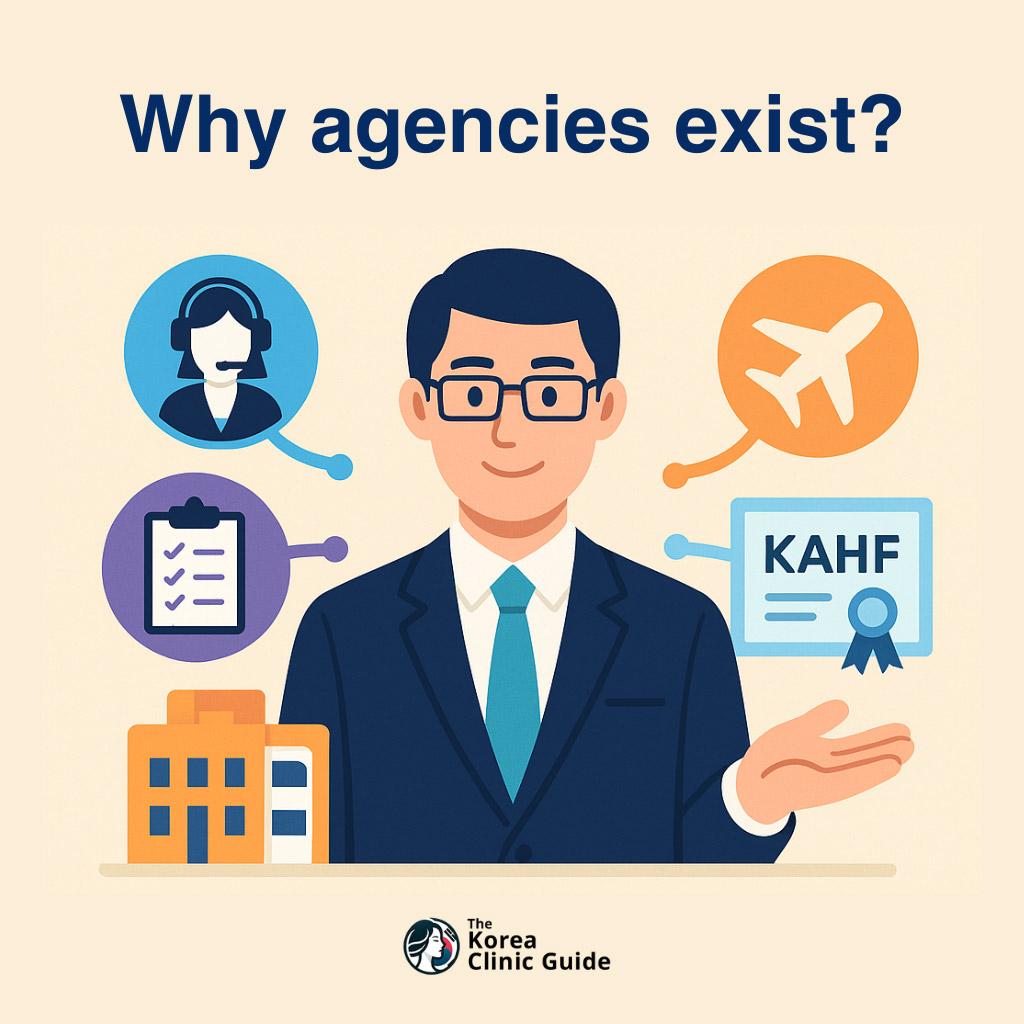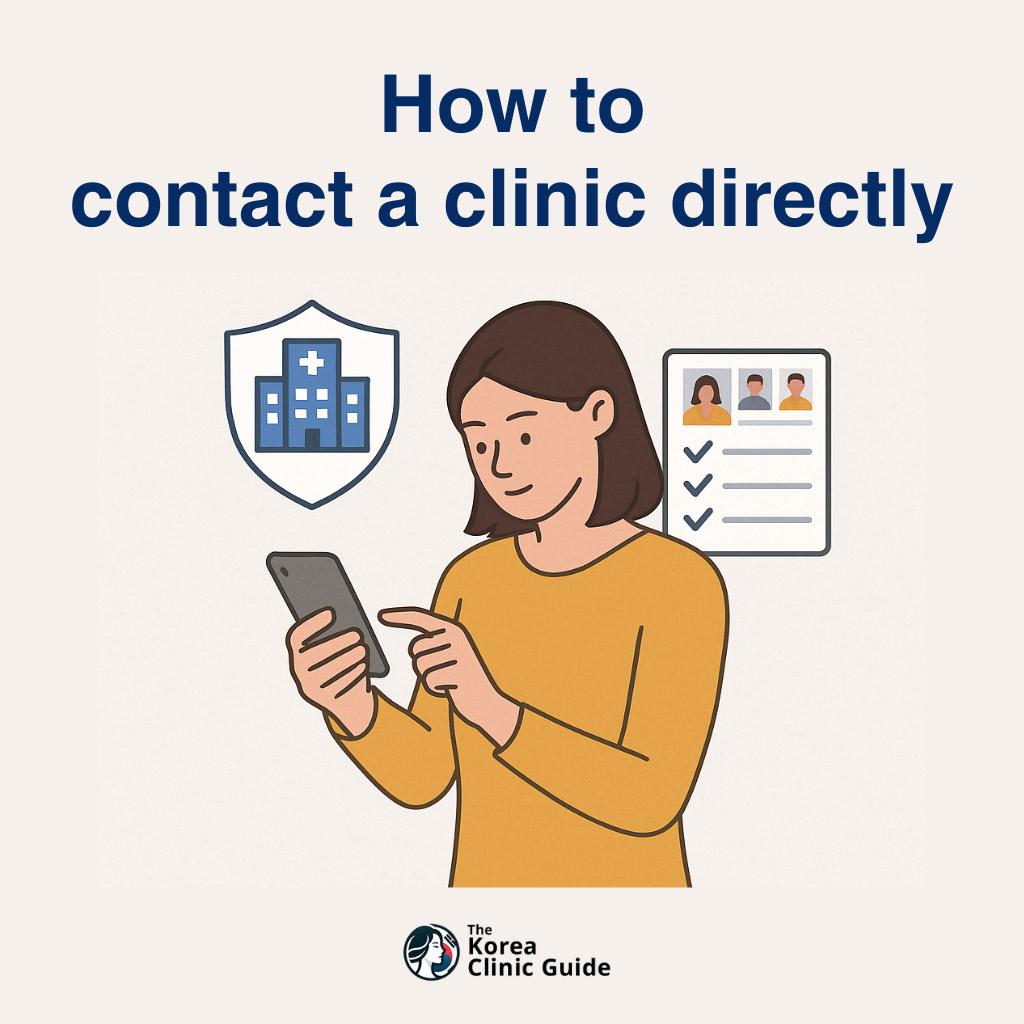Medical Tourism Blog
Agency vs. Contacting Clinics Directly: How to Choose (and Find a Good Agency) for Medical Tourism in Korea (2025 Guide)

Table of contents
- What “direct contact” means
- Why agencies exist (and when they help)
- Practical safety checks (mini-checklist)
- Do medical tourism agencies upcharge? (and how to verify)
- Comparison: Agency vs. Contacting Clinics Directly
- How to find (and vet) a good agency — step by step
- Red flags to avoid
- How to contact a clinic directly (step-by-step)
- What to do if something goes wrong
- Bottom line
Considering treatment in Korea? Everything you need to know e.g. — how to avoid scams, visas, interpreters, recovery tips — in our Medical Tourism Master Guide. Plan with confidence in minutes, not weeks!
Thinking about coming to Korea for cosmetic, dental, dermatology, or other care—but not sure whether to hire an agency or book clinics yourself? This guide explains what agencies actually do, how to vet them, how to stay in control of your medical decisions, and when going direct makes sense. It also includes a quick comparison table and copy-paste questions you can send to agencies.
What “direct contact” means
Direct contact means you communicate and contract directly with the clinic’s international team—no third-party agency in between. You handle research, consultations, scheduling, payments, logistics, and any dispute yourself.
Why some patients choose direct
- More control & clarity: Speak with the clinic coordinator and operating surgeon; fewer intermediaries.
- Potential savings: No bundled “concierge” fees; quotes are usually on clinic letterhead.
- Targeted choice: Easier to pick a specific surgeon/technique.
What you take on
- Verification: Check the clinic’s registration to treat foreign patients; confirm surgeon credentials/case volume.
- Coordination: Time zones, interpretation, transfers, lodging, aftercare.
- Problem-solving: If anything goes wrong, you escalate yourself (clinic → official channels).
Direct is a good fit when… you already have 2–3 clinics/surgeons in mind, are comfortable organizing travel, and the clinic offers clear English support (or you have your own interpreter).
Consider an agency when… you want multi-clinic comparisons, stronger language/logistics support, or help escalating if issues arise.
Why agencies exist (and when they help)

A good agency acts like your project manager for care abroad: they coordinate quotes and schedules across clinics, provide interpreters, arrange airport/hotel transfers, and help with after-care and paperwork. Most are paid by clinics (commission), so insist on full disclosure of partner clinics and fee structures—and ask for multi-clinic options, not just one “preferred” provider. This model is legal in Korea if the agency is properly registered to attract foreign patients under the Medical Service Act.
Bonus safeguard: many hospitals/clinics obtain KAHF accreditation (Korean Accreditation Program for Hospitals Serving Foreign Patients), a MOHW-backed program focused on safety and service quality for international patients. Treat it as a plus, not a must.
Practical safety checks (mini-checklist)
-
Verify the agency’s legal status
Ask for a copy or photo of their registration certificate (외국인 환자 유치업 등록증). Agencies and clinics that attract foreign patients must register with the Minister of Health & Welfare (Medical Service Act Article 27-2). Decline if they can’t prove it.
-
Confirm the clinic’s status separately
Look up the clinic in Medical Korea’s database of registered providers How to Verify Good Clinics in Korea?
-
Ask about incentives
“How many clinics do you work with? Are commissions similar across clinics? Will you show multiple options and itemized KRW quotes?” Transparency matters more than “free service” claims.
-
Keep control of medical decisions
You choose the surgeon and the plan. Cross-check board certification, surgeon case volume, and ask to put the operating surgeon’s name on the consent.
-
Get it in writing
Scope of interpretation, cancellation/refund terms, emergency escalation, who holds your money (agency vs. clinic), and after-care support.
Do medical tourism agencies upcharge? (and how to verify)
Sometimes. Many are clinic-commissioned so your price can match clinic list price—but not always. Upcharges can be explicit (service fees) or implicit (bundled extras, steering to pricier packages, bad FX/DCC).
Your upcharge-proofing checklist
- Get itemized KRW quotes from ≥2 clinics with identical inclusions (surgeon, anesthesia, facility/OR, devices/units, meds/garments, follow-ups, VAT, any card surcharge).
- Ask for price parity in writing and the clinic letterhead estimate (PDF).
- Pay the clinic directly when possible and get a KRW receipt.
- Confirm in advance: payment method, card/wire fees, and that billing is in KRW (no DCC).
- Ask how the agency is compensated and whether commissions are uniform across clinics.
Comparison: Agency vs. Contacting Clinics Directly
| Category | Through an Agency | Directly with a Clinic |
|---|---|---|
| Convenience | One-stop service: the agency arranges consultations, interpreters, transportation, and sometimes even accommodation. | Patients must organize everything themselves (consultations, transfers, lodging, interpretation). However, some clinics have their own team for international patients, including full online consultations before coming to Korea. |
| Language Support | Agencies usually provide multilingual coordinators, making communication smoother. | Many big clinics have in-house coordinators, but smaller ones may have limited English or other language support. |
| Clinic Options | Agencies work with a network of partner clinics, offering multiple options and comparisons. | You only deal with one clinic at a time—you’ll need to compare multiple hospitals on your own. |
| Pricing | May include agency fees or bundled packages, which can increase costs slightly. But some agencies negotiate discounts with clinics. | Direct booking may appear cheaper, but there’s less transparency if you don’t know the market. |
| Legal & Safety | Reputable agencies work only with government-registered foreign patient attracting institutions, giving patients added security. | Patients must check registration and accreditations themselves (to avoid unregistered or unsafe clinics). |
| Aftercare & Follow-up | Agencies often assist with aftercare coordination and help if complications or disputes arise. | Follow-up is only between the patient and the clinic; resolving issues may be harder for foreigners. However, good clinics have their own follow-up systems, even for international patients. |
| Customization | Agencies can combine treatments across clinics (e.g., dental + plastic surgery). | Each clinic only offers its own specialties. |
How to find (and vet) a good agency — step by step
- Shortlist 3–5 agencies — Use search + community threads to spot transparency and multi-clinic support.
- Request documents — Ask for a scan/photo of the agency’s registration certificate and links to Medical Korea profiles for proposed clinics.
- Ask these questions (copy-paste)
- Which clinics do you partner with for my procedure? How many options will you show?
- Who pays you (commission/fee)? Are commissions similar across clinics?
- Will I get itemized KRW quotes (surgeon, anesthesia, facility/OR, devices, meds, aftercare, VAT, card surcharge)?
- Will the operating surgeon’s name be on the consent? Can I see before/after of similar cases?
- What interpretation is included (pre-op, surgery day, follow-ups)?
- Refund/cancellation policy—clinic or agency? Who holds my deposit?
- If complications occur, how do you escalate and who handles emergency coordination?
- Compare like-for-like — Align inclusions; “cheaper” isn’t cheaper if anesthesia/devices/aftercare are missing.
- Keep control — The agency facilitates; you select the surgeon/plan. Decline hard-sell tactics.
- Paper trail — Keep PDFs of the certificate, emails, quotes, consents, and receipts.
Red flags to avoid
-
No proof of registration (agency or clinic).
-
One-clinic-only recommendations / heavy pressure to book today for a discount.
-
Vague or shifting pricing; won’t provide itemized KRW quotes.
-
Won’t share the surgeon’s full name/credentials.
-
Glossy marketing with thin medical detail; poor answers to safety questions.
(These issues come up repeatedly in community reports—double-check before paying.)
How to contact a clinic directly (step-by-step)

- Shortlist 3–5 clinics — Prefer registered foreign-patient providers; note any KAHF accreditation.
- Verify the clinic & surgeon — Ask for the clinic’s registration number; confirm the operating surgeon’s full name, board specialty, and case volume for your procedure. [ How to verify a good clinic? ]
- Prepare your packet — Photos (front/45°/profile, no filters), top 3 goals, medical history/meds/allergies (incl. anticoagulants, isotretinoin, nicotine), travel window, contact info.
- Contact them — What questions should I ask during an online consultation?
- Compare like-for-like — Same inclusions across clinics; watch for missing line items.
- Book securely — Pay the clinic in KRW, avoid DCC, and get KRW receipts. Keep PDFs of quote/policy/deposit/consent.
- Confirm logistics — Pre-op tests, interpreter availability, aftercare schedule, and a 24/7 contact post-op.
Red flags (direct contact edition): No surgeon name on consent, no itemized quote on clinic letterhead, “book today” pressure, requests for USD cash with no KRW receipt, weak answers on safety/aftercare. Read More About: How to Spot a Bad (Low‑Quality) or “Factory” Clinic in Korea
What to do if something goes wrong
Start with a polite, time-boxed written complaint to the clinic (or via your agency). If unresolved, escalate to:
- Medical Korea Information Center (counseling for foreign patients; triage)
- Korea Consumer Agency (1372) for deposits/refunds/unfair terms
- K-Medi (Korea Medical Dispute Mediation & Arbitration Agency) for medical complications/disputes
Read More about: Patient Rights in Korea – How to Raise a Dispute
Bottom line
Agencies can be safe and useful—especially for first-timers—if they’re registered, transparent about incentives, and willing to show multiple clinics. Even with an agency, independently verify the clinic and surgeon. Going direct can work well for experienced travelers or when a clinic’s international team is strong—just run the same checks, insist on itemization, and keep a paper trail.







